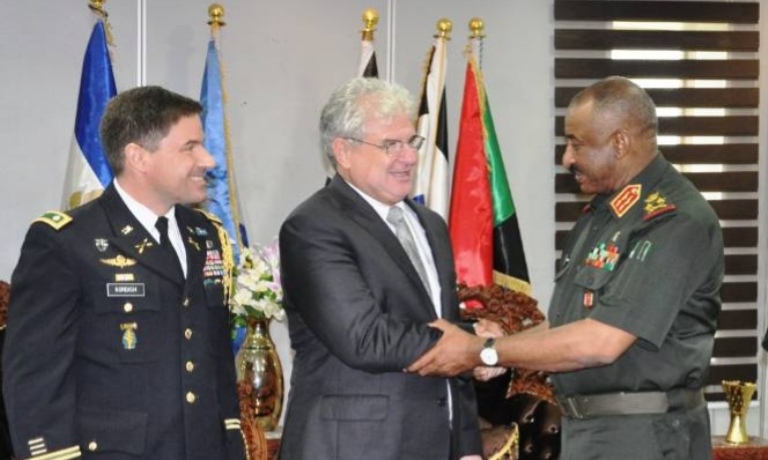U.S. invites senior Sudanese military to conference on counter-terrorism

September 23, 2018 (KHARTOUM) – The Sudanese army Chief of General Staff Lt. Gen. Kamal Abdel-Marouf Sunday received an invitation to a counterterrorism conference organized by the US administration in Washington.
The invitation was extended to Gen. Abdel-Marouf by U.S Chargé d’Affaire in Khartoum Stephan Koutsis in the presence of US military attaché Colonel Adam Kordish.
The conference on countering violent extremism will take place in Washington with the participation of senior military officials from different countries
This is the first time that the Chairperson of Joint Chiefs of Staff of USA, General Joseph Dunford, invites his Sudanese counterpart to such a meeting on counter-terrorism
In a statement released after the meeting with the US Ambassador Kourtis, Abdel Raouf stressed the importance of continued exchange between the two countries to develop bilateral relations through dialogue and joint action.
In April 2017, Sudan participated for the first time in the meeting of the United States Africa Command known as “AFRICOM”. At the time, the Sudanese army Chief of General Staff Lt. Gen. Emad al-Din Mustafa Adawi took part in a meeting of AFRICOM chiefs of general staff in Stuttgart, Germany.
Last Wednesday 19 September, the U.S. State Department released its report on terrorism which has kept Sudan on the list of states sponsoring terrorism. However, Washington said Khartoum remains a partner in the counter-terrorism.
After the left of economic sanctions on Sudan in October 2017, U.S. Deputy Secretary of State, John Sullivan, was in Khartoum in November of the same year to launch the second phase of the normalization process and pointed to the need for reforms on human rights and religious freedom.
The east African nation was placed on the U.S. terrorism list in 1993 over allegations it was harbouring Islamist militants working against regional and international targets.
(ST)
